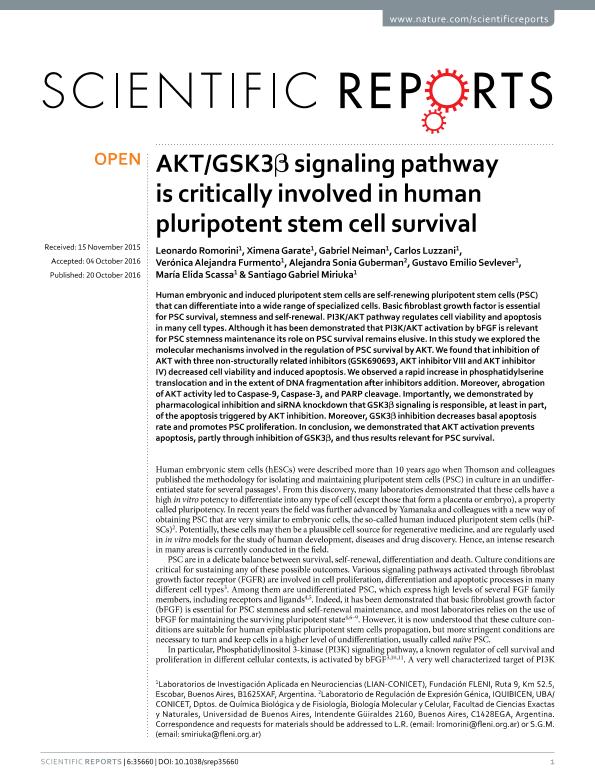Artículo
AKT/GSK3B signaling pathway is critically involved in human pluripotent stem cell survival
Romorini, Leonardo ; Garate, Ximena
; Garate, Ximena ; Neiman, Gabriel
; Neiman, Gabriel ; Luzzani, Carlos Daniel
; Luzzani, Carlos Daniel ; Furmento, Verónica Alejandra
; Furmento, Verónica Alejandra ; Guberman, Alejandra Sonia
; Guberman, Alejandra Sonia ; Sevlever, Gustavo; Scassa, Maria Elida; Miriuka, Santiago Gabriel
; Sevlever, Gustavo; Scassa, Maria Elida; Miriuka, Santiago Gabriel
 ; Garate, Ximena
; Garate, Ximena ; Neiman, Gabriel
; Neiman, Gabriel ; Luzzani, Carlos Daniel
; Luzzani, Carlos Daniel ; Furmento, Verónica Alejandra
; Furmento, Verónica Alejandra ; Guberman, Alejandra Sonia
; Guberman, Alejandra Sonia ; Sevlever, Gustavo; Scassa, Maria Elida; Miriuka, Santiago Gabriel
; Sevlever, Gustavo; Scassa, Maria Elida; Miriuka, Santiago Gabriel
Fecha de publicación:
10/2016
Editorial:
Nature Publishing Group
Revista:
Scientific Reports
e-ISSN:
2045-2322
Idioma:
Inglés
Tipo de recurso:
Artículo publicado
Clasificación temática:
Resumen
Human embryonic and induced pluripotent stem cells are self-renewing pluripotent stem cells (PSC)that can differentiate into a wide range of specialized cells. Basic fibroblast growth factor is essentialfor PSC survival, stemness and self-renewal. PI3K/AKT pathway regulates cell viability and apoptosisin many cell types. Although it has been demonstrated that PI3K/AKT activation by bFGF is relevantfor PSC stemness maintenance its role on PSC survival remains elusive. In this study we explored themolecular mechanisms involved in the regulation of PSC survival by AKT. We found that inhibition ofAKT with three non-structurally related inhibitors (GSK690693, AKT inhibitor VIII and AKT inhibitorIV) decreased cell viability and induced apoptosis. We observed a rapid increase in phosphatidylserinetranslocation and in the extent of DNA fragmentation after inhibitors addition. Moreover, abrogationof AKT activity led to Caspase-9, Caspase-3, and PARP cleavage. Importantly, we demonstrated bypharmacological inhibition and siRNA knockdown that GSK3β signaling is responsible, at least in part,of the apoptosis triggered by AKT inhibition. Moreover, GSK3β inhibition decreases basal apoptosisrate and promotes PSC proliferation. In conclusion, we demonstrated that AKT activation preventsapoptosis, partly through inhibition of GSK3β, and thus results relevant for PSC survival.
Palabras clave:
Akt Signalling
,
Pluripotent Cells
,
Cell Survival
Archivos asociados
Licencia
Identificadores
Colecciones
Articulos(SEDE CENTRAL)
Articulos de SEDE CENTRAL
Articulos de SEDE CENTRAL
Citación
Romorini, Leonardo; Garate, Ximena; Neiman, Gabriel; Luzzani, Carlos Daniel; Furmento, Verónica Alejandra; et al.; AKT/GSK3B signaling pathway is critically involved in human pluripotent stem cell survival; Nature Publishing Group; Scientific Reports; 6; 10-2016; 1-15; 3566
Compartir
Altmétricas



